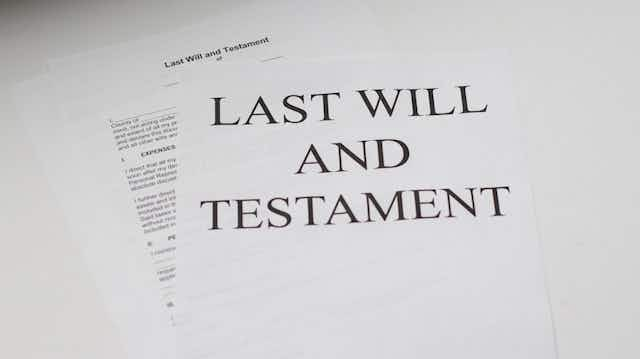How Do Wills Work Before and After Someone Dies?
Updated
Published


Cake values integrity and transparency. We follow a strict editorial process to provide you with the best content possible. We also may earn commission from purchases made through affiliate links. As an Amazon Associate, we earn from qualifying purchases. Learn more in our affiliate disclosure.
How do wills work? Wills have a strange and complex life cycle. There are two very distinct periods of time during which a will functions. These periods of time are before and after your death.
Jump ahead to these sections:
You must write your will and make it official (or “execute” it) before you die. However, wills do not become effective (or “speak”) until after you die. Once it becomes effective (when you die), it is already completed—you cannot change, revoke, or update it.
Once you are deceased, the only thing someone can do to your will is to contest it and ask the court to invalidate it (to determine that it was never effective). However, someone can only do this after you die, when you're not able to defend your will.
The process of a will may seem strange but you may appreciate the process more if you understand how it functions during each of the two very distinct periods before and after your death.
What Happens with Wills Before Someone Dies
Before you die, there are six things you can do with your will.
1. Create your will
To have a will, the first thing you have to do is create it. There are three ways to do this:
- Your attorney can draft your will after meeting with you to discuss your estate and the most advantageous way for you to dispose of your property.
- You can create a will by printing a form from one of the many online services that provide templates premised on the probate laws in your state.
- You can draft your own will, either on your computer or by handwriting it on a permanent surface.
However you create your will, it should include:
- Who you want to name as your executor (the person who administers your estate)
- How you want to dispose of your property (you can designate specific property to specific people (called “beneficiaries”)
- Your preferences for your funeral and burial
- Any directions for paying your debts
- Your signature and the signatures of the required number of witnesses
If you're stuck between choosing an online will service, basic estate planning attorney, or a complex estate planning attorney, compare the choices below.
| Option | Price range | Best if you... | Get started |
|---|---|---|---|
|
$15-$250 |
| ||
| Basic estate planning attorney |
$300-$3,000 |
| |
| Attorney who specializes in complex estates |
$3,001+ |
|
2. Amend your will
Once you and your witnesses sign your will, it is considered “executed.” This means that if you were to die at any point, your executor could submit your will to the court for it to be probated.
Between the time you execute your will and the time you die, you should review your will periodically to determine if you would like to amend it in any respect. You can amend your will at any time before you die. Here are some common reasons why you might want to amend your will:
- You experience a major life change, like getting married, getting divorced, having another child, and adopt a child.
- You acquire more property.
- You dispose of property.
- You create new relationships or terminate old relationships.
- You change your charitable interests.
- You want to name a different or successor executor.
You can amend your will for any reason. When you amend your will, you must follow all the rules for executing a will. Any supplemental will that you create is called a “codicil.”
3. Revoke your will
At any time between creating a will or a codicil and your death, you can revoke your will and/or codicil. To revoke your will means that you no longer want your will to be valid or effective if you die.
Each state has specific rules for what you must do to revoke your will or effect a “revocation” of your will. Generally, there are three kinds of revocation of a will:
Revocation by physical act. Your state will define the physical acts that will qualify as a valid revocation of your will. These include acts like:
- Tearing
- Cutting
- Burning
- Destroying
- Obliterating
- Mutilating, etc.
Any of these physical acts must be done with the intent to revoke your will for it to be an effective revocation. If you accidentally tear or burn your will without intending to revoke it, it is not revoked.
Also, any physical act revocation usually must be done by the testator (the testator is you, the maker of the will) and in the presence of witnesses, or by someone else at your direction.
Some states require that any physical act of revocation taken upon the will must “touch upon the words of the will,” which means that your physical act must alter the words written on the will. Other states require only that you conduct a physical act on the will, generally.
You also can revoke part of your will by crossing out only the specific language you want to revoke. You must be careful to be clear about your intent to make only a partial revocation.
Revocation by subsequent instrument: You may revoke a will, in whole or in part, by expressing this intent in a subsequent will. If you draft a subsequent will and want to revoke your existing will, you would include a statement like: “I hereby revoke all previous wills and codicils that I have made.”
Revocation by operation of law: Your will may be revoked automatically by law, without you doing anything to your will or even intending to revoke your will. This normally occurs when you have a provision in your will that refers to your future or previous spouse and you get married or divorced after executing your will. Upon your marriage or divorce, any provisions of your will referring to your spouse will be revoked automatically by law.
For example, if you execute your will the day before your wedding and, anticipating a long life together with your spouse, you included your future spouse in your will, upon your marriage the next day, any provisions in your will referencing your spouse will be revoked by operation of law. If you want to include your new spouse in your will after you are married, you must re-execute your will.
4. Revive your will
If you have revoked a previous will before you die, you can revive your previous will, which means you can bring it back to life and make it valid again. You can do this by:
- Re-performing on the revoked will the same steps you took to execute the will originally (re-execution).
- Incorporating the previously revoked will into a new will by referencing it in the new will (incorporation by reference).
- If you only revoked a previous will because you thought a subsequent will was valid but the subsequent will turns out to be invalid, some states will allow the court to revive the previously revoked will if it accommodates your intent stated in the invalid will more than intestacy (intestacy is the law that determines the distribution of your property to your heirs when you die without a will).
5. Review your will regularly
Whenever you have a will that is validly executed, you should review it often to determine whether you want to amend or revoke your current will. Whatever is the most recently validly executed will that exists at the time of your death will be the will that the court probates.
6. Probate your will before you die
There are a very small number of states that allow a process called “pre-mortem” or “antemortem” probate. This means that the state will allow you to file your will with the court before you die. However, your estate is not probated before you die.
The process only allows the court to validate your will while you are alive so if there is any contest of your will, you can respond to it and if your will is deemed invalid, you can still execute another will. Once the court determines that your will is valid, however, it prevents others from contesting your will after you die.
What Happens With Wills After Someone Dies
When you die with a validly executed will, your executor may initiate the probate process, through which the court will dispose of your property and close-out or “probate” your estate. The probate process generally includes six components:
7. Submitting your will to probate
When you die, your executor must locate your will and file it with the probate court in the county where you resided when you died. When your executor files your will, they will petition the court for “Letters Testamentary.”
The court will grant Letters Testamentary to authorize your executor to take control of your estate, give notice to your creditors and heirs, transfer titles, and distribute your property according to your will.
8. Notice to creditors
The law requires that your executor issue notice of your death and the initiation of probate proceedings to certain persons, including:
- Your legal heirs, who are your closest living relatives when you die, as defined by state statute.
- Anyone named in your will as a beneficiary.
- Anyone named in your will who is not a beneficiary under your will.
- Any persons named as guardians of your children.
- Your creditors.
- Anyone with an interest in your will or who would inherit from you through intestacy, if you had died without a will.
Your creditors will have a window of time, defined by state statute (called a “nonclaim provision”) to assert their claim to your estate. If they do not file their claim within the allotted time period, they are prohibited from asserting their claim.
9. Contesting the will
Anyone with standing (meaning anyone with an interest in your will) may contest the validity of your will. Someone may contest the validity of your will for many reasons, including:
- Failure to satisfy the formalities of a valid will:
- Lack of testamentary capacity (too young, mentally incapacitated)
- Lack of a writing
- Lack of the required number of qualified witnesses
- Lack of a fully intended signature
- No date (if required)
- The will is not entirely in the handwriting of the testator (for a holographic will, where recognized)
- Lack of intentionalities:
- Lack of mental capacity (intoxicated)
- Lack of intent
- Insane delusion (mental incapacity)
- Undue influence
- Fraud
If the court determines that your will is invalid, your estate will be distributed to your legal heirs through the laws of intestacy.
10. Spousal election against the will
If you intentionally omit your spouse from your will or your spouse is dissatisfied with what they receive under your will, your spouse may “elect against the will.”
This means that the court will allow your spouse to waive his benefit under your will and elect for a statutory share of your estate that attempts to equate what your spouse receives in probate with what they would have received had your marriage ended in divorce rather than in death.
11. Probate of your will
Over the course of often a year or more, your executor will:
- Pay your debts.
- Pay your taxes.
- Transfer titles.
- Dispose of your property.
- Close out all accounts.
- File an accounting with the court.
If the court approves of the executor’s final accounting for the administration of your estate, the court will declare your estate officially closed.
12. Filing your will as a public record
When the court closes your estate, your will is filed in the courthouse as a public record. Anyone may then obtain your will by requesting to view it at the courthouse.
The 12-Step Life-Cycle of a Valid Will
Between the time you execute a will during your life and the time your estate is probated and closed after you die, your will undergoes a complex 12-step life cycle. The only time you can affect your will is during your life.
Once you die, unless someone contests your will and the court invalidates it, whatever is in your will is going to dictate how your estate is distributed to your family, friends, or heirs. The sooner you create your will, the more time you will have to make it the way you want it.
Post-planning tip: If you are the executor for a deceased loved one, you have more than just the will to think about. Handling their unfinished business can be overwhelming without a way to organize your process. We have a post-loss checklist that will help you ensure that your loved one's family, estate, and other affairs are taken care of.



